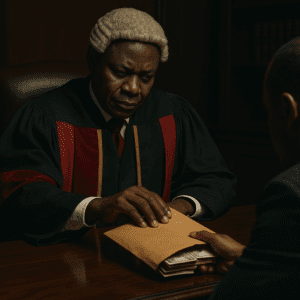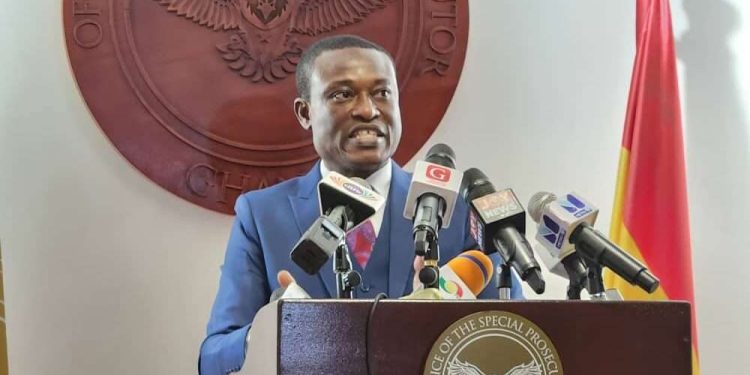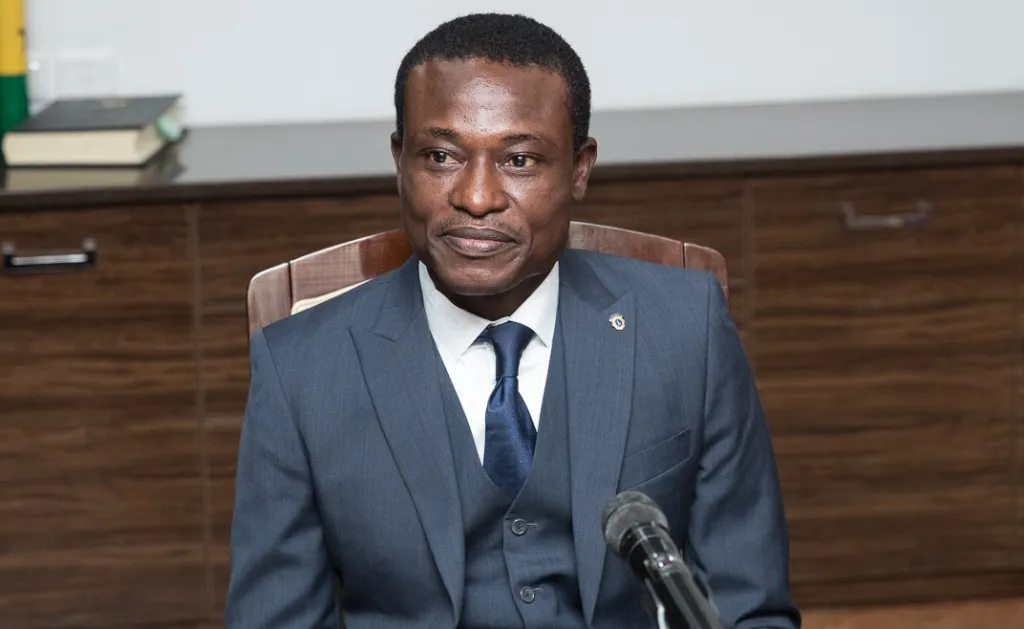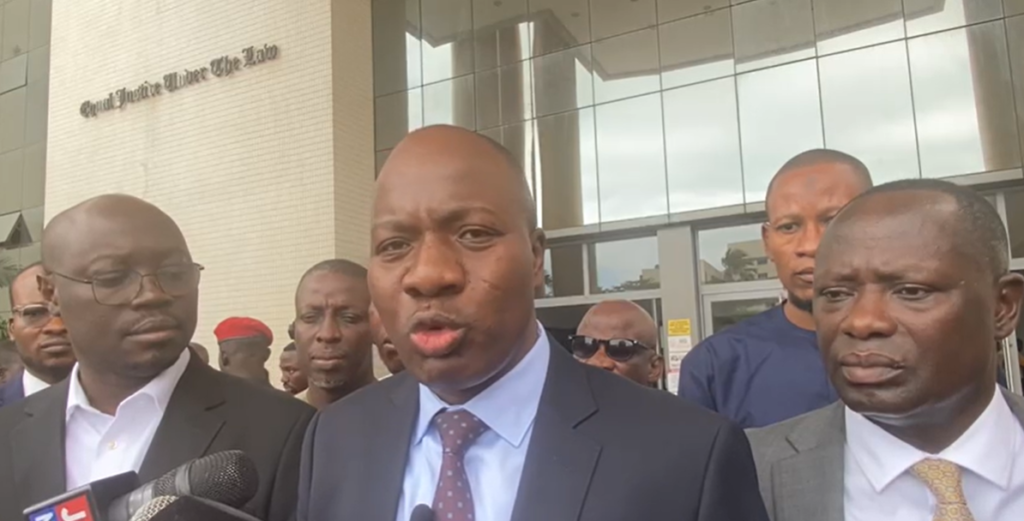This is the 3rd Piece of a 4 part series.
Part 1 may be obtained here.
Part 2 may be obtained here
4.0 CORRUPTION IN THE JUDICIARY
Despite the existence of perceptions and evidence of corruption among some judges, many judges maintain a commitment to integrity, actively discouraging bribery and corruption.
These judges often endeavor to educate court users about the principle that justice is not for sale and encourage public trust in the justice system. However, given that judges are not the sole actors within the judicial framework, their efforts do not always yield the desired outcomes.

A corrupt judge typically does not engage in bribery independently; rather, a third party often acts as an intermediary between the judge and court users. Such intermediaries may include lawyers, court staff, prosecutors, investigators, or individuals closely associated with the judge in their daily functions, including drivers.
Forum Non Conveniens
The prevalence of corruption in the judiciary has reached such levels that even judges who actively reject bribery and corruption often recount instances in which their names have been misused by the aforementioned actors to solicit or obtain money from court users. Given the widespread belief among Ghanaians that judges are corrupt, these actors have exploited this perception to their advantage.
A judicial colleague recounts an incident involving a court user who arrived at her court with baskets of food items, which he claimed were intended for her. He explained that he had frequently provided similar gifts to her predecessor and believed it prudent to continue this practice. At the time, she was in her chambers when the registrar informed her of this “gift.”
She proceeded to observe the foodstuffs positioned near her vehicle. She advised the court user to take the food home to his family, asserting that she was compensated through his taxes and did not require additional remuneration to fulfill her official duties.
Months later, the judge discovered that her driver had followed the court user as he exited with the food items and had communicated to him that the judge had reconsidered her initial stance, claiming that she had acted in such a manner due to the public nature of the gift.
The driver informed the court user that he was to collect the food on behalf of the judge and provided his phone number, suggesting that the court user should contact him in the future regarding similar gifts. By the time the judge became aware of this situation, her driver had solicited food items from the court user on multiple occasions over a span of six months.
This narrative serves to illustrate the extent to which perceptions of corruption within the judiciary have become entrenched, such that even when a judge publicly denounces corrupt practices, court users may continue to harbor contrary beliefs.
“Wicked Judge”
From my own experience, during my initial decade as a judge, I made it a priority to publicly declare to court users each day before proceedings commenced that I neither accepted bribes nor authorized anyone to do so. I emphasized that both the giver and receiver of bribes aimed at corrupting the judicial process would face legal repercussions if discovered. I encouraged parties to focus their efforts on presenting sufficient evidence to sway the scales of justice in their favor.
I was astonished to learn, three years into my tenure at a specific station, that an investigator and a station officer had allegedly demanded and received bribes, intended to influence my decision to grant bail to an individual facing multiple robbery charges.
This accused individual had been brought before me on a robbery charge and was granted bail. While on bail, he was subsequently arraigned again on a new robbery charge, which the prosecution submitted was committed while he was out on bail, leading me to deny him bail on the new charge.
On several occasions, he appeared in court, asserting that he was unwell, prompting me to order his treatment at a government medical facility. The medical reports, however, did not indicate any serious illness, and he remained in custody.
During his trial, the accused disclosed that the investigator, after accepting money ostensibly for me, had coached him on how to feign illness in court to elicit my sympathy in hopes of securing bail.
He further stated that when I had ordered him to be treated at a government medical facility, the investigator had solicited additional funds from him to ensure a favorable medical report that would persuade me to grant bail. When these efforts proved ineffective, he approached the station officer, who informed him that the amount the investigator had received was insufficient for a judge, necessitating further contributions. Consequently, he provided additional funds to the station officer for delivery to me.
According to his account, when he continued to press for answers as to why I had not granted him bail and was rather concentrated on expediting the trial, the investigator maintained that I was merely a malevolent judge and repeatedly questioned, “Why would a woman exhibit such wickedness? Just bail too?” The accused, after several months of observing my progress in the trial, which did not align with his expectations, chose to disclose this information during the opening of his defense. I subsequently referred both the investigator and the station officer to the Inspector General of Police for investigation.
It is worth noting my astonishment that, despite my daily announcements against corruption and bribery, which were translated into various languages for the benefit of all individuals present in court, including both the investigator and the accused person, such actions still transpired.
“I have Done my Part”
The third narrative focuses on a colleague judge and her interactions with a prosecutor. The judge recounts that after instructing the prosecution to file disclosures for a case management conference, the prosecution consistently failed to meet the filing deadlines and subsequently requested extensions.
Following five extensions, the prosecutor informed the court that he was experiencing difficulties in contacting the complainant to obtain signatures for the witness statements.
The prosecutor further submitted that the complainant was the principal witness and that the prosecution would be unable to sustain the charge without their testimony. Consequently, he prayed to withdraw the case. The court complied with this request and discharged the accused individual.
My colleague further elaborates that upon retiring to her chambers, she overheard the prosecutor engaged in a phone conversation with an individual who, based on the tone of the dialogue, appeared to be the accused.
The prosecutor was demanding that the remainder of his payment be sent to him via mobile money transfer, asserting that he had fulfilled his obligations by keeping the complainant uninformed about the case’s progress and facilitating the court’s dismissal of the matter.
The judge, taken aback by this revelation, summoned the prosecutor and the registrar into her chambers. She subsequently reported her observations and suspicions to the police administration for further investigation.
In this scenario, had the judge not overheard the prosecutor, it is plausible that the complainant would later have been informed that the court had dismissed the case without any explanation.
Such a complainant, given the pervasive concerns regarding judicial integrity, might reasonably conclude that the judge had been compromised by the accused party.
“The Life of the Law has not been Logic, it has been Experience”
It is important to emphasize that many prosecutors, court personnel, and lawyers have extensive experience within the court system and possess a comprehensive understanding of its intricacies. Many have worked in the justice “business” for more than twenty years.
For prosecutors, as a result of the apprenticeship system previously discussed, they acquire knowledge, both the positive and negative, from their experienced colleagues and subsequently transmit this knowledge to others.
Some of these individuals are particularly skilled at crafting submissions to achieve favorable outcomes in cases. Frequently, these actions are motivated by financial gain, with the blame directed at the judiciary.
Throughout my tenure as a practicing attorney, assistant lecturer, and judge, I have encountered numerous accounts of legal practitioners imposing exorbitant fees on clients, justifying these charges by asserting the necessity to “settle the judge.”
Additionally, there are reports of lawyers who, on occasion, present gifts to judges, particularly during festive seasons, with the intention of eliciting more favorable treatment in cases presented before them.
Further anecdotes describe lawyers actively seeking membership in associations frequented by judges, aiming to cultivate a sense of camaraderie with these judicial figures. The underlying objective of this strategy is the belief that familiarity with a judge may yield favorable judicial outcomes in the future.
While these accounts remain anecdotal and, without substantiation, can only be classified as tales, they present a troubling narrative for both the legal profession and the judiciary.
Such perceptions undermine the integrity of both the bar and the bench, fostering a lasting impression of collusion that threatens the fundamental principle of justice, particularly the notion that judges should render decisions without fear or favor.
It must be on record that numerous accounts exist of lawyers who prioritize winning cases based on their merits and professional expertise. These lawyers explicitly communicate to their clients that they will return their files if the clients attempt to bribe a judge without their knowledge.
It is also noteworthy that some clients may seek to influence judges through intermediaries, independent of their legal counsel. They may engage in this behavior with the understanding that their lawyers are unlikely to endorse such a strategy, driven by the perception that without resorting to bribery, they are predisposed to losing the case regardless of their counsel’s legal acumen. This is particularly true if they fear that the opposing party is likely to engage in corrupt practices.
Tactical Experience
Numerous accounts exist regarding the conduct of prosecutors and investigators who reportedly solicit and accept financial payments from both accused individuals and complainants, ostensibly to facilitate bribes to judges.
Some court users assert that the determination of the vigor with which prosecution pursues a case is contingent upon the financial contributions received from both parties with some prosecutors reportedly demanding “transportation fare” from complainants, akin to the practices of legal representatives.
In instances where the accused offers the highest bid, prosecutorial efforts may be intentionally delayed, accompanied by various trivial excuses presented to the court for the purposes of seeking adjournments.
These justifications are proffered with the understanding that a court may eventually dismiss a case and discharge the accused person if it perceives that the prosecution is not being conducted fairly and within a reasonable time.
Conversely, when the complainant provides the highest financial incentive, the prosecution is more likely to appear consistently in court and ensure that all necessary processes are filed and witnesses are made available for an expeditious trial.
This phenomenon suggests a correlation between financial influence and prosecutorial commitment, commonly referred to as “he who pays the piper.”
Additionally, when courts mandate settlements in accordance with provisions aimed at promoting reconciliation as outlined in the Courts Act, there are reports indicating that prosecutors and investigators may retain a portion of any funds paid by an accused individual intended for a complainant.
Of particular concern is the existence of instances where such funds are withheld based on misleading assertions that a portion must be allocated to the judge or the Judicial Police. (JUPOL)
I do not seek to absolve judges of complicity in this matter, as there have indeed been instances where prosecutors and investigators have received such moneys and subsequently transferred all or a portion of these funds to the judge as their share.
While some individuals make the source of the money explicit, others present it as gifts or reimbursements for fuel to unsuspecting judges. The term “unsuspecting” is employed cautiously, as it is essential to acknowledge that a judge should not accept gifts from any party involved in a case.
Furthermore, for court personnel, frequent access to a judge’s chambers outside of official court sessions, as well as casual interactions with judges in settings beyond the courtroom, including the seemingly innocuous act of delivering documents to a judge’s vehicle, may serve to foster an environment of familiarity and camaraderie.
This dynamic can be exploited to cultivate the impression among court users that the judge is susceptible to influence through that particular court staff. It is important to note that it may take a newly appointed judge several years to recognize this phenomenon and establish necessary boundaries, by which time significant damage may have already occurred.
“A Collective Effort”
The deeply entrenched perception of corruption within the judiciary suggests that addressing this issue necessitates more than the efforts of individual judges. It highlights the vital importance of engaging various stakeholders within the justice sector. Absent their collective commitment to combating corruption, the judiciary’s ability to effectively address this pervasive issue remains significantly constrained.
CONCLUSION-A Shared Goal Necessitates a Collective Effort.
Many will agree that when all stakeholders collaborate with a mutual understanding to achieve a common vision and objective, there is a significantly enhanced likelihood of success.
The challenges facing the justice administration system in Ghana, which is overseen by the Judiciary, necessitate a concerted effort not only from the Judiciary but also from lawyers and prosecutors to effectively address these issues.
It is imperative that Ghanaians receive an efficient, effective, and well-functioning judiciary in which they can place their trust to resolve disputes and foster societal growth and development.
The Judiciary bears the responsibility of ensuring that, in fulfilling its role as the administrator of justice on behalf of Ghanaians, the reasonable expectations of the populace are met. However, lawyers and prosecutors, also play a complementary role in this obligation.
Regardless of the efforts exerted by the Judiciary, these expectations can only be fully realized if it collaborates closely with prosecutors and lawyers to guarantee that each stakeholder is able to fulfill their duties as prescribed by law.
When stakeholders are provided with the necessary support and motivation to execute their roles, it will complement the Judiciary’s efforts in addressing persistent challenges, such as delays in trials and corruption, to the greatest extent possible. The strength of our justice system, lies not only in the hands of the judiciary but also in the architectural designs crafted by lawyers and prosecutors.




